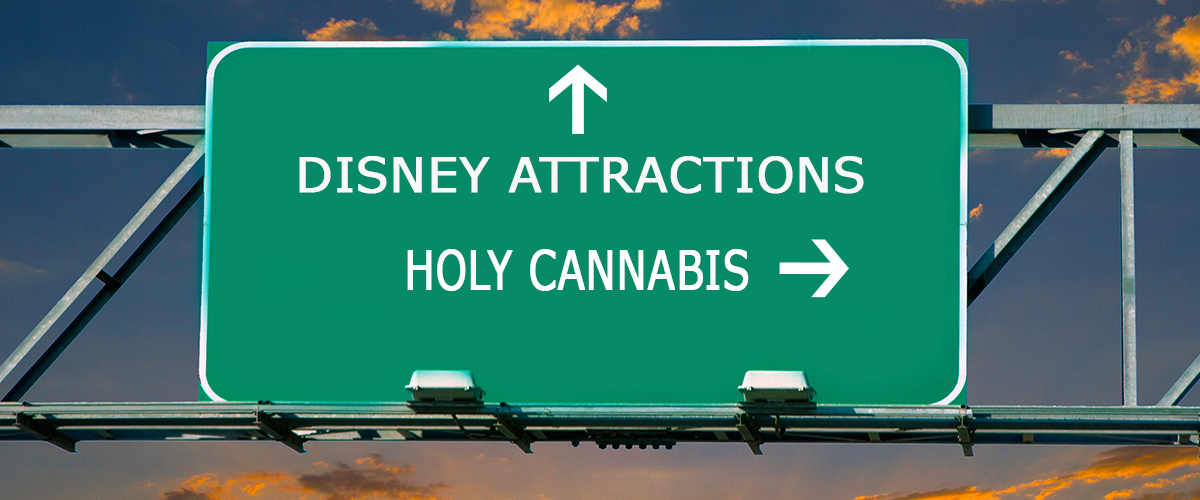Cannabis Church Going High Tech To Become A New Orlando Florida Attraction.
In an article published July 22, 2019 in High Times, it is reported that an Orlando, Florida cannabis church known as “Reflections Ministry” is producing a new cannabis-inspired multi-sensory experience blending music, light, live performers, and theatrical effects with a spiritual message about overcoming life’s obstacles. The production, titled “The Reflections Show,” was created by cannabis advocate and technology artist Joseph Andrew.
The article goes on to report that Mr. Andrew already has ideas for the expansion of the Reflections Ministry and is seeking sponsors and investors to help fuel its growth. Plans for the future include the construction of a cafe featuring plant-based comfort foods from Jaya Bressack. The venue will also be available to rent for seminars, weddings, video production, and other private events.
With entrepreneurs taking advantage of state legalization of cannabis, we are seeing more innovative approaches to adding cannabis consumption into entertainment and dining venues. But despite these innovations, cannabis still remains illegal under Federal law.
The Anti-Federal U.S. Climate
The Federal Controlled Substances Act (“CSA”) 21 U.S.C. § 812 classifies marijuana as a Schedule 1 substance with a high potential for abuse, no currently accepted medical use in treatment, and lack of accepted safety for use under medical supervision. Although you can still face federal criminal charges for using, growing, or selling weed in a manner that is completely lawful under California law and other states that have legalized cannabis, the federal authorities in the past have pulled back from targeting individuals and businesses engaged in medical marijuana activities. This pull back though has no impact on the IRS which will likely start in 2019 to more aggressively target cannabis businesses with audits.
Risks Of Running A Cannabis Business
Higher Taxes Still Remain
It still remains to be seen when favorable changes will be made to the Internal Revenue Code which treats businesses in the marijuana industry differently resulting in such business paying at least 3-times as much in taxes as ordinary businesses.
Generally, businesses can deduct ordinary and necessary business expenses under I.R.C. §162. This includes wages, rent, supplies, etc. However, in 1982 Congress added I.R.C. §280E. Under I.R.C. §280E, taxpayers cannot deduct any amount for a trade or business where the trade or business consists of trafficking in controlled substances…which is prohibited by Federal law. Marijuana, including medical marijuana, is a controlled substance. What this means is that dispensaries and other businesses trafficking in marijuana have to report all of their income and cannot deduct rent, wages, and other expenses, making their marginal tax rate substantially higher than most other businesses.
Reporting Of Cash Payments Still Remain
The Bank Secrecy Act of 1970 (“BSA”) requires financial institutions in the United States to assist U.S. government agencies to detect and prevent money laundering. Specifically, the act requires financial institutions to keep records of cash purchases of negotiable instruments, and file reports of cash purchases of these negotiable instruments of more than $10,000 (daily aggregate amount), and to report suspicious activity that might signify money laundering, tax evasion, or other criminal activities. The BSA requires any business receiving one or more related cash payments totaling more than $10,000 to file IRS Form 8300, Report of Cash Payments Over $10,000 Received in a Trade or Business.
The minimum penalty for failing to file EACH Form 8300 is $25,000 if the failure is due to an intentional or willful disregard of the cash reporting requirements. Penalties may also be imposed for causing, or attempting to cause, a trade or business to fail to file a required report; for causing, or attempting to cause, a trade or business to file a required report containing a material omission or misstatement of fact; or for structuring, or attempting to structure, transactions to avoid the reporting requirements. These violations may also be subject to criminal prosecution which, upon conviction, may result in imprisonment of up to 5 years or fines of up to $250,000 for individuals and $500,000 for corporations or both.
Marijuana-related businesses operate in an environment of cash transactions as many banks remain reluctant to do business with many in the marijuana industry. Like any cash-based business the IRS scrutinizes the amount of gross receipts to report and it is harder to prove to the IRS expenses paid in cash. So it is of most importance that the proper facilities and procedures be set up to maintain an adequate system of books and records.
How Do You Know Which Cannabis Tax Attorney Is Best For You?
Given that cannabis is still illegal under existing Federal law you need to protect yourself and your marijuana business from all challenges created by the U.S. government. While cannabis is legal in California, that is not enough to protect you. It’s coming down that the biggest risk is TAXES. Be proactive and engage an experienced Cannabis Tax Attorney in your area. Let the tax attorneys of the Law Offices Of Jeffrey B. Kahn, P.C. located in Orange County (Irvine), Metropolitan Los Angeles and other California locations protect you and maximize your net profits. If you are involved in crypto currency, check out how a bitcoin tax attorney can help you.


